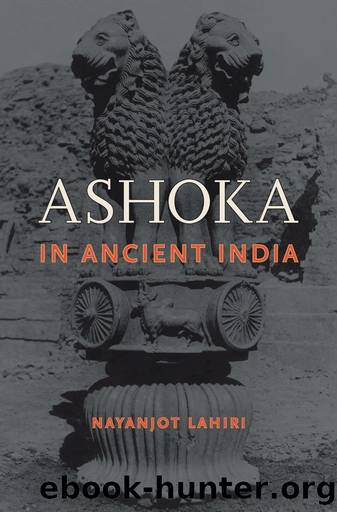Ashoka in Ancient India by Lahiri Nayanjot

Author:Lahiri, Nayanjot
Language: eng
Format: epub
ISBN: 9780674915251
Publisher: Harvard University Press
Published: 2015-08-05T00:00:00+00:00
The Arthashastra had stressed the importance of such accessibility too. The king was expected to be always active, hear urgent matters and never put them off, look into the affairs of all kinds of people and places: âtemple deities, hermitages, heretics, Brahmins learned in the Vedas, cattle and holy places, of minors, of the aged, the sick, the distressed and the helpless and of women, in this order, or, in accordance with the importance of the matter or its urgency.â14 The manual prescribes designated areas for the kingâs public interactions. Unrestricted entrance was necessary for those wanting to see him in connection with their affairs, but it was in the assembly hall that such audiences were to be held. Like other areas in the palace where interactions and decisions relating to state matters were made, this hall was to be separated from the inner apartments, the fear of violence being a constant threat. Indeed, âeveryone (in the palace) should live in his own quarters and not move to the quarters of another.â15
None of these anxieties feature in Ashokaâs account of his administrative innovations. The informality outlined is so complete that one is tempted to imagine the kingâs eating and love-making interrupted by people with problems rushing in and out of his private chambers. The reality is likely to have been far less colourful, the access to the emperor careful and limited. The change would nonetheless have been seen as a new political culture in which the common weal required âexertion and prompt dispatch of business [. . .] Whatever effort I make is made in order that I may discharge the debt which I owe to all living beings, that I may make them happy in this world, and that they may attain heaven in the next world.â The expressions here are uncannily and ironically similar to the extolling of the energetic king in the Arthashastra:
In the happiness of the subjects lies the happiness of the king and in what is beneficial to the subjects his own benefit. What is dear to himself is not beneficial to the king, but what is dear to the subjects is beneficial (to him).
Therefore, being ever active, the king should carry out the management of material well-being. The root of material well-being is activity, of material disaster its reverse.16
Download
This site does not store any files on its server. We only index and link to content provided by other sites. Please contact the content providers to delete copyright contents if any and email us, we'll remove relevant links or contents immediately.
AI 2041 by Kai-Fu Lee & Chen Qiufan(597)
The Love Songs of W.E.B. Du Bois by Honoree Fanonne Jeffers(547)
Pop Song by Larissa Pham(427)
A Nation of Women by Luisa Capetillo(380)
The wind in the willows by Kenneth Grahame(378)
The Dressmakers of Auschwitz by Lucy Adlington(375)
Thirteen Lessons that Saved Thirteen Lives by John Volanthen(359)
The Queen's Agent by Cooper John(353)
Power Moms by Joann S. Lublin(347)
Available by Laura Friedman Williams(344)
The Sisters of Auschwitz by Roxane van Iperen(340)
Listen by Kathryn Mannix(334)
The Disappearance of Lydia Harvey by Julia Laite(317)
House of Kwa by Mimi Kwa(308)
Mother of All by Jenna Glass(294)
Stolen by Elizabeth Gilpin(292)
Life and Limb: (A Standalone Zombie Reverse Harem Romance) by Michaela Haze(291)
Cunning Women by Elizabeth Lee(285)
Something Blue by Pots Jessica(281)
